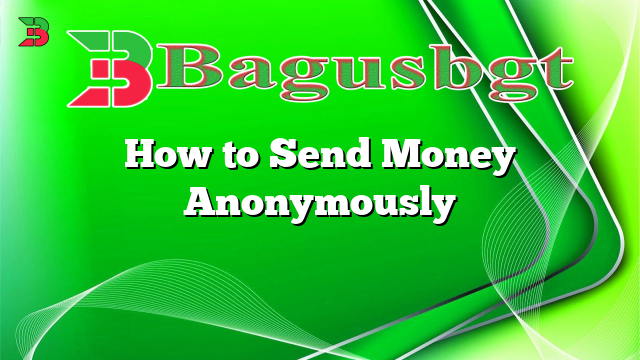Salam! In today’s digital age, privacy and security have become major concerns, especially when it comes to financial transactions. Many individuals prefer to send money anonymously to protect their identity and maintain their confidentiality. In this article, we will explore various methods and alternatives to send money anonymously, discussing their advantages, disadvantages, and detailed explanations.
1. Cryptocurrencies
Cryptocurrencies, such as Bitcoin, offer a decentralized and anonymous way to send money. Transactions are recorded on a public ledger, but the identities of the participants are encrypted. While this provides a certain level of privacy, it is important to note that some cryptocurrencies may not be entirely anonymous, as transactions can still be traced back to the wallet addresses.
Advantages: Cryptocurrencies offer quick and secure transactions, and they can be accessed from anywhere in the world.
Disadvantages: The value of cryptocurrencies can be volatile, and their acceptance is limited compared to traditional currencies.
2. Prepaid Cards
Prepaid cards, also known as anonymous debit cards, can be purchased without revealing personal information. These cards can be loaded with funds and used for online or in-person transactions. However, it is essential to ensure that the card is not linked to your identity through any registration process.
Advantages: Prepaid cards are widely accepted, easy to use, and provide a level of anonymity.
Disadvantages: Some prepaid cards may have limited functionality and high fees.
3. Money Transfer Services
Money transfer services, such as Western Union or MoneyGram, allow individuals to send money anonymously by using a pseudonym or a generic receiver’s name. However, it is crucial to consider the applicable regulations and restrictions in each country.
Advantages: Money transfer services are widely available, offer convenience, and allow for cash pickup at various locations.
Disadvantages: These services may have high fees and limited transaction amounts.
4. Online Payment Platforms
Some online payment platforms, like PayPal or Venmo, offer the option to send money anonymously by using a unique email address or username instead of personal information. However, it is important to note that these platforms may still collect and store user data for security and legal purposes.
Advantages: Online payment platforms are widely used and provide a seamless way to send money.
Disadvantages: Anonymity may be limited, and transaction fees may apply.
5. Peer-to-Peer (P2P) Networks
Peer-to-peer networks, such as LocalBitcoins or LocalCryptos, connect individuals who want to buy or sell cryptocurrencies directly. These platforms allow users to negotiate terms and exchange funds without revealing their identities. However, caution should be exercised to avoid scams and fraudulent activities.
Advantages: P2P networks offer direct transactions, competitive prices, and the potential for anonymous exchanges.
Disadvantages: Users need to be cautious of fraudulent sellers and ensure the security of their funds.
6. Wire Transfers
Wire transfers can be used to send money anonymously by using a generic recipient name or an alias. However, it is important to consider the regulations and fees associated with international wire transfers.
Advantages: Wire transfers provide a direct and secure method for sending large amounts of money.
Disadvantages: The process can be time-consuming, and fees may vary depending on the service provider.
7. Money Orders
Money orders can be purchased with cash and sent anonymously to a recipient. The sender’s personal information is not disclosed, but it is essential to ensure that the money order is not linked back to the purchaser through any form of record-keeping.
Advantages: Money orders are widely accepted, secure, and can be easily sent through mail.
Disadvantages: There may be limitations on the maximum amount that can be sent, and fees may apply.
8. Foreign Bank Accounts
Opening a bank account in a foreign jurisdiction with strict privacy laws can provide a level of anonymity for sending money. However, it is crucial to comply with all legal and tax obligations in both the home and foreign countries.
Advantages: Foreign bank accounts offer increased privacy and can be beneficial for individuals with international financial interests.
Disadvantages: Setting up and maintaining a foreign bank account can be complex and costly.
9. Using a Trusted Middleman
Engaging a trusted middleman, such as a lawyer or a financial advisor, can help facilitate anonymous money transfers. These professionals can act as intermediaries and ensure the confidentiality of the transaction.
Advantages: Trusted middlemen provide expertise, guidance, and an additional layer of security for anonymous transactions.
Disadvantages: The involvement of a middleman may increase costs and add complexity to the process.
10. Bartering and Non-Monetary Exchanges
Bartering and non-monetary exchanges offer an alternative to traditional money transfers. By exchanging goods or services directly, individuals can avoid using a financial system altogether. However, this method may not be suitable for all types of transactions.
Advantages: Bartering allows for direct exchanges, fosters community connections, and eliminates the need for monetary transactions.
Disadvantages: The value of goods or services exchanged may not always be equal, and finding suitable bartering partners can be challenging.
Conclusion
Sending money anonymously can be achieved through various methods, each with its own advantages and disadvantages. Whether you choose to use cryptocurrencies, prepaid cards, money transfer services, or other alternatives, it is crucial to weigh the benefits of anonymity against the potential risks and limitations. Understanding the available options and their implications can help individuals make informed decisions to protect their privacy and security in financial transactions.
Method |
Advantages |
Disadvantages |
|---|---|---|
Cryptocurrencies |
Quick and secure transactions |
Value volatility, limited acceptance |
Prepaid Cards |
Widely accepted, easy to use |
Limited functionality, high fees |
Money Transfer Services |
Widely available, cash pickup option |
High fees, limited transaction amounts |
Online Payment Platforms |
Convenient, widely used |
Limited anonymity, transaction fees |
Peer-to-Peer Networks |
Direct transactions, competitive prices |
Risk of scams, security concerns |
Wire Transfers |
Direct and secure for large amounts |
Time-consuming, varying fees |
Money Orders |
Secure, easily sent through mail |
Limitations on amount, fees apply |
Foreign Bank Accounts |
Increased privacy, international benefits |
Complex and costly setup |
Using a Trusted Middleman |
Expertise, guidance, added security |
Higher costs, increased complexity |
Bartering and Non-Monetary Exchanges |
Direct exchanges, community connections |
Unequal value, challenges in finding partners |
Frequently Asked Questions (FAQ)
Q: Is it illegal to send money anonymously?
A: Sending money anonymously is not inherently illegal, but it can be subject to regulations and restrictions depending on the jurisdiction and the purpose of the transaction. It is important to comply with local laws and regulations to avoid any legal issues.
Q: Can I send money anonymously internationally?
A: Sending money anonymously internationally can be more challenging due to varying regulations and compliance requirements. It is advisable to research and understand the specific laws and restrictions of the countries involved before attempting an international anonymous money transfer.
Q: Are there anylimits on the amount of money I can send anonymously?
A: The limits on the amount of money you can send anonymously can vary depending on the method you choose. Some prepaid cards or money transfer services may have maximum transaction limits. Additionally, certain countries may have restrictions on the amount of money that can be sent anonymously. It is important to check the terms and conditions of the specific method or service you are using to understand any limitations.
Q: How can I ensure the security of my anonymous money transfers?
A: To ensure the security of your anonymous money transfers, it is important to take certain precautions. Use secure and reputable platforms or services, such as encrypted cryptocurrency wallets or trusted money transfer services. Always double-check the recipient’s information to avoid any errors or fraudulent activities. Additionally, consider using a virtual private network (VPN) to protect your online activities and prevent your IP address from being traced.
Q: Can I receive anonymous money transfers?
A: Yes, you can receive anonymous money transfers, depending on the method used by the sender. If someone chooses to send money anonymously to you, they may use methods such as cryptocurrencies or prepaid cards. However, it is important to consider the legal and regulatory implications of receiving anonymous money transfers in your jurisdiction.
Q: Are there any risks associated with sending money anonymously?
A: Sending money anonymously can come with certain risks. There is a potential for fraudulent activities or scams, especially when using peer-to-peer networks or dealing with unknown individuals. Additionally, the lack of documentation or proof of transaction can make it challenging to resolve any disputes or issues that may arise. It is important to be cautious, do thorough research, and use trusted platforms or services when sending money anonymously.
Sending money anonymously can provide individuals with a sense of privacy and security in their financial transactions. However, it is crucial to understand the available methods, their advantages, disadvantages, and any legal considerations. By making informed decisions and taking necessary precautions, individuals can protect their anonymity while ensuring the safety and legitimacy of their money transfers.
 Bagus Banget Kumpulan Informasi terbaru dari berbagai sumber yang terpercaya
Bagus Banget Kumpulan Informasi terbaru dari berbagai sumber yang terpercaya


